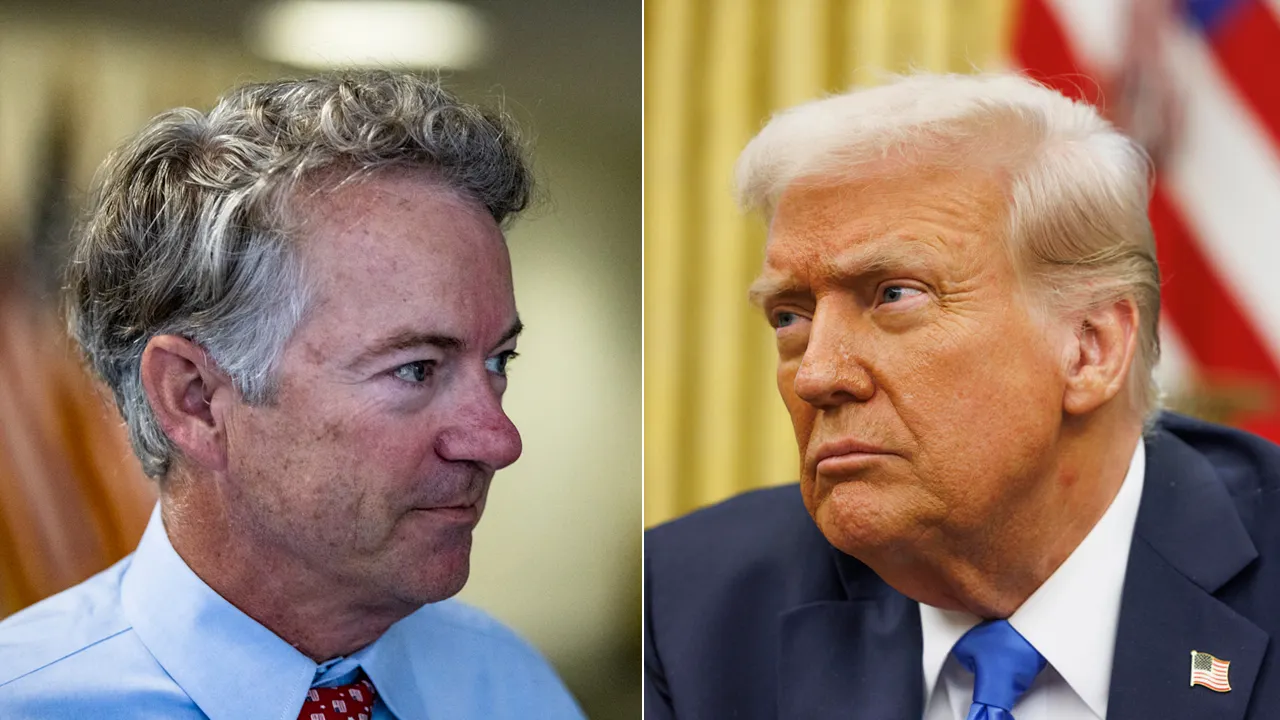As the third anniversary of Russia’s Ukraine invasion nears, United States President Donald Trump has offered a false version of history.
US and Russian representatives held talks in Saudi Arabia this week that included a discussion on how to end the war in Ukraine. Later, Trump dismissed complaints that Ukrainian officials were not invited to participate.
“I think I have the power to end this war, and I think it’s going very well,” Trump said, answering reporters’ questions on February 18 at his Mar-a-Lago resort in Florida. “But today I heard [from Ukraine], ‘Oh well, we weren’t invited.’ Well, you’ve been there for three years. You should have ended it three years – you should have never started it, you could have made a deal.”
This clashes with the evidence that Russia sent a large invasion force into Ukraine in February 2022.
The notion that Kyiv “started it” – that it is to blame for an invasion that has killed an estimated 46,000 Ukrainian soldiers and at least 12,000 civilians – led to outrage in Ukraine and from its allies.
Ukrainian President Volodymyr Zelenskyy responded that Trump “lives in this disinformation space”.
Trump’s deputy in his first term, Mike Pence, posted on February 19 on X, “Mr President, Ukraine did not ‘start’ this war. Russia launched an unprovoked and brutal invasion claiming hundreds of thousands of lives. The Road to Peace must be built on the Truth.”
After Zelenskyy’s comments, Trump piled on more attacks on Truth Social, claiming the Ukrainian president “is very low in Ukrainian Polls” and is “a Dictator without Elections”.
In a Kyiv International Institute of Sociology poll conducted between February 4 and 9, Zelenskyy had a 57 percent trust rating among Ukrainians surveyed. That is down from 90 percent in May 2022, shortly after Russia’s invasion, but up from 52 percent in December 2024. Ukrainian law bans parliamentary and presidential elections during a state of martial law, which currently exists. Zelenskyy has promised elections once martial law is lifted.
We asked the White House for evidence that Ukraine had started the war and received no response.
Russia’s attempt to blame Ukraine is part of a longstanding argument that does not stand up to scrutiny.
What happened in February 2022
As people were sleeping, Russian troops and tanks rolled into Ukraine and missiles poured down in what US military analysts called the largest military operation in Europe since World War II. The attack followed weeks of Russian manoeuvres that included staging a large-scale military exercise along Russia’s border with Ukraine that the US estimated to include 190,000 Russian soldiers.
News coverage, video footage and the United Nations noted Russia’s invasion of Ukraine in real time. Russian President Vladimir Putin announced it as a “special military operation” at 6am Moscow time (03:00 GMT) on February 24, 2022.
“The purpose of this operation is to protect people who, for eight years now, have been facing humiliation and genocide perpetrated by the Kyiv regime,” Putin said in a televised address. “To this end, we will seek to demilitarise and denazify Ukraine, as well as bring to trial those who perpetrated numerous bloody crimes against civilians, including against citizens of the Russian Federation.”
About 800km (500 miles) and a time zone away, residents of Kyiv awoke to the sounds of explosions. In the small eastern city of Sloviansk in Ukraine’s Donetsk region, loud booms drove people from their beds in panic. Families packed belongings, swarmed ATMs and filling stations, and tried to flee the Russian invasion in cars, trains, planes and on foot.
How did the false talking point that Ukraine started the war begin?
To set the stage for the invasion, Putin had long denied Ukraine was even a country, falsely characterising its history and culture, arguing the Ukrainians were simply Russians who needed to be brought back into the fold.
PolitiFact recognised Putin’s lies justifying the Ukraine war as “our 2022 Lie of the Year”.
In 1990, Ukraine’s parliament declared its independence from the Soviet Union, a call it repeated in August 1991. Ukraine gained its independence four months later. In December 1991, Ukrainians voted overwhelmingly for independence, and within days, the USSR dissolved. In 1994, Ukraine agreed with the US, the United Kingdom and Russia to exchange its nuclear arsenal, the world’s third-largest, for security guarantees.
But the rush of post-Soviet history grated on Putin, analysts say.
Putin has served as Russia’s top leader since 1999, with a four-year period in which he was nominally number two but was widely considered the country’s ultimate centre of power.
He has long sought to establish the theoretical foundations for escalating the war in Ukraine, a country with about one-third the population of Russia and, before the war, about one-ninth the gross domestic product.
As early as 2008, Putin told then-President George W Bush that “Ukraine is not a country”. Since then, Putin has asserted that there is no such thing as a Ukrainian people separate from Russia.
“These claims were designed to deny the existence and agency of the Ukrainian nation,” Erik Herron, a West Virginia University political scientist and author of the book Elections and Democracy after Communism, told PolitiFact in 2022.
Yet, the history of Ukraine has involved several empires or states, some of which were entirely separate from Russia, Eugene Finkel, an associate professor with Johns Hopkins University’s School of Advanced International Studies, told PolitiFact on the eve of the war.
Putin set the table for the 2022 invasion with a 5,000-word essay in July 2021. In it, he argued that much of modern-day Ukraine occupies historically Russian lands and that “Russia was robbed” of them.
Putin’s essay blamed the conflict on the West, claiming that the protest-driven ouster of Ukrainian President Viktor Yanukovych in 2014, an ally of Russia, was engineered from the outside and that the Ukrainian government elected in 2014 was illegitimate.
Putin argued that Ukraine was poised “to join NATO and have NATO missiles placed in Ukraine and aimed at Russia”, said Alexander Motyl, a Rutgers University-Newark political scientist. In Putin’s telling, “poor Russia was forced to rush to the persecuted Ukrainians’ defense and forestall NATO-inspired Ukrainian aggression”, Motyl said.
In 2023, Russian Prime Minister Dmitry Medvedev echoed Putin’s stance, saying Ukraine is a part of Russia, but “we live in different apartments”.
Soon after the war started, more than 140 scholars signed a letter denouncing Putin’s narrative as “factually wrong, morally repugnant and deeply offensive to the memory of millions of victims of Nazism and those who courageously fought against it, including Russian and Ukrainian soldiers of the Red Army”.
As for Trump’s recent remark, it is a “distillation of these Russian talking points”, Herron said.
Our ruling
Trump said Zelenskyy “started” the war in Ukraine with Russia.
On February 24, 2022, Russian forces launched an invasion of Ukraine, a country that the night before was at peace. Putin called it a “special military operation” and he premised the attack on false claims about Ukraine. As people were sleeping, Russian troops and tanks rolled into Ukraine and missiles poured down in what US military analysts called the largest military operation in Europe since World War II.
The attack followed weeks of Russian manoeuvres that included staging a large-scale military exercise along Russia’s border with Ukraine that the US estimated to include 190,000 Russian soldiers.
We rate the statement Pants on Fire!















